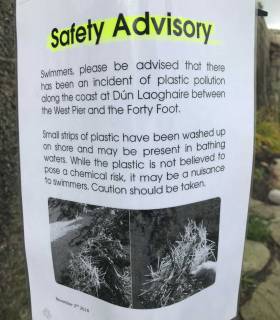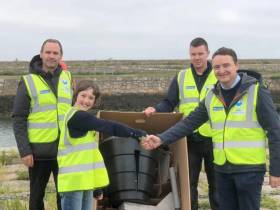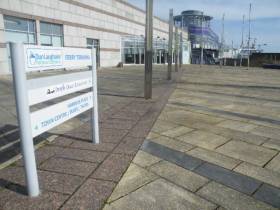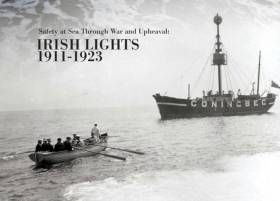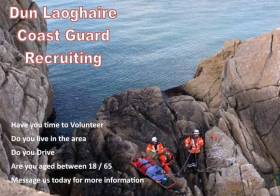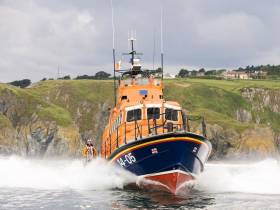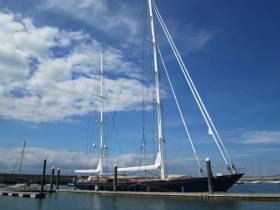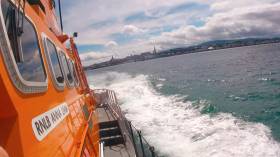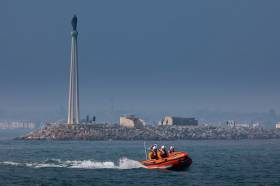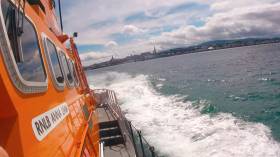Displaying items by tag: Dun Laoghaire
Safety Advisory For Swimmers Over Plastic Pollution At Forty Foot
#Safety - Dun Laoghaire-Rathdown County Council has posted a safety advisory for swimmers in Dun Laoghaire over an incident of plastic pollution between the West Pier and the Forty Foot.
According to the local authority, “small strips of plastic” that have washed ashore in recent days may be present in bathing waters.
While the plastic poses no chemical danger, it could be a nuisance or at worst a physical risk to swimmers.
As The Irish Times reports, contractors working on the redevelopment of the Dun Laoghaire baths site are launching a clean-up operation in the affected area after “a quantity of fibres” was washed into the water during a concrete pour.
It follows community efforts led by local environmental hero Flossie Donnelly, who recently donated a second Seabin for cleaning surface debris in Dun Laoghaire Harbour to the National Yacht Club.
#Seabin - Five months after local coastal litter campaigner Flossie Donnelly saw the installation of Dun Laoghaire Harbour’s first Seabin, the enterprising youth has presented the National Yacht Club with its own water-cleaning device.
According to the Dun Laoghaire waterfront club, 12-year-old Flossie’s fundraising efforts for Ireland’s first ever Seabin were so inspiring that the company behind the project donated a second device for free.
The Seabin is essentially a floating bucket with a pump that sucks in surfacedebris and traps it for collection. A single device has the potential to collect as many as 20,000 plastic bottles or more than 80,000 plastic bags each year.
Flossie’s Seabin initiative has since won some influential support from NYC stalwart Annalise Murphy, who raced around the world on board Turn the Tide on Plastic in the most recent Volvo Ocean Race.
The National Yacht Club has more on the story HERE.
Harbour Innovation Campus Plans For Dun Laoghaire Scrapped Due To Lack Of Foreshore Licence
Ambitious plans for a digital technology hub at the former Dun Laoghaire ferry terminal have been scrapped by its developer in the absence of the necessary foreshore licence.
As recently as August, the Harbour Innovation Campus project was moving forward after securing planning permission almost a year after the scheme was announced.
However, in an email to interested parties as seen by Afloat.ie this evening (Monday 29 October), developer Philip Gannon said that a year after signing the lease on the former terminal building, “the landlords have still not secured the foreshore licence necessary to allow them to legally lease the building to us.
“Needless to say I am appalled by this fact, given all of the time and trouble that I put into this project. I spent nine months finding a suitable fit-out team that were due to start in January.
“When I told them that work could not commence until a foreshore licence was granted, they told me they don’t do ‘stand-by’ and would be starting on another project in the new year instead.”
Citing uncertainty surrounding the foreshore licence, and the difficulties involved in putting together a new fit-out team, Gannon said: “I felt that I had no option but to terminate the lease and find an alternative property elsewhere.”
He added: “I deeply regret that in the end, I was unable to make this vision a reality in Dun Laoghaire.”
As previously reported on Afloat.ie, Gannon had been intending to invest €20 million in transforming the St Michael’s Pier building into the largest technology hub in Ireland, supporting up to 50 companies and as many as 1,000 jobs.
‘Safety at Sea Through War and Upheaval’ is the title of an exhibition now running at the dlr Lexicon in Dun Laoghaire, highlighting the history of Ireland’s lighthouses between the years 1911 and 1923.
Using resources from the Irish Lights archive, the exhibition – which runs till 7 January — next year explores the mission of safe navigation at sea in the context of the wider political and economic changes in Ireland at the time: independence, civil war, electrification and more.
A deeper focus on the years of the Great War is afforded by a new exhibition on the SS Hare and SS Adela in Dublin Port, which comes to dlr Lexicon this Monday (8 October) and tells the story of both ill-fated vessels during the rise of the U-boat threat from 1914 to 1918.
Keeping with the maritime theme, the late Des Branigan is the subject of a new display (opened yesterday, Friday 5 October) of archive material from photographs to books that give a rounded picture of a humble, ordinary seaman who achieved extraordinary things.
All exhibitions are open free to the public during library opening hours.
Dun Laoghaire Coastguard Recruiting New Volunteers
#Coastguard - Do you live in or around Dun Laoghaire and have time to volunteer? Do you drive? Are you aged between 18 and 65?
If so, you may be the right fit for Dun Laoghaire Coastguard, which is currently running a recruitment drive.
Send the unit a message via Dun Laoghaire Coastguard's official Facebook page with your details for further information about the important lifesaving role.
Dun Laoghaire Lifeboat Launched To Powerless Powerboat Off Killiney
#RNLI - Shorter evenings mean having a method of calling for help on the water is more important than ever.
The message from the RNLI came after the Dun Laoghaire lifeboat launched on Tuesday evening (4 September) to a powerboat with three on board that had broken down in Killiney Bay.
The volunteer lifeboat crew was requested to launch their all-weather lifeboat at 7.50pm following a report from the Irish Coast Guard.
Weather conditions were fair with a northern breeze and visibility was good as the all-weather lifeboat located and successfully towed the vessel back towards Dun Laoghaire Marina. All three onboard were uninjured.
Commenting after the callout, Dun Laoghaire RNLI coxswain Mark McGibney said: “The long evenings are starting to get shorter, so it is vital to have a means of calling for help in case you do end up in trouble.”
Superyacht ‘Christopher’ Returns To Dun Laoghaire
#Superyachts - Afloat.ie has learned that superyacht Christopher is moored in Dun Laoghaire Marina this morning (Monday 13 August) after passage from Belfast.
The 46m Ron Holland-designed cruising ketch previously sailed into Dublin Bay in June 2014, when it was considered Dun Laoghaire’s largest ever visiting yacht.
Since then the marina has hosted various other super-sized vessels — including the 35.8m Arcadia, a yacht sturdy enough to transit the Northwest Passage — which prompted Afloat.ie to ask whether a dedicated superyacht berth could be a realistic proposal for Dun Laoghaire.
#RNLI - Dun Laoghaire RNLI responded to a small powerboat with six onboard on Sunday evening (5 August) when their vessel was caught up on a fishing pot marker just off Dalkey.
The volunteer lifeboat crew was requested to launch their all-weather lifeboat at 10.49pm following a report from the Irish Coast Guard. Weather conditions were fair with a slight breeze, and visibility was good.
Two of the volunteer crew members used the XP-class lifeboat to free the vessel from the pot marker. The lifeboat then lifeboat successfully towed the vessel away from the rocks and escorted it back towards Dun Laoghaire Harbour.
Commenting after the callout, Dun Laoghaire RNLI second coxswain Eamon O’Leary said: “It was dark during the callout and in these situations it is so important to raise the alarm as soon as possible and to ensure that everyone onboard is wearing a lifejacket.”
The incident comes only a month after a small yacht with two on board became entangled on a pot marker outside the harbour, as previously reported on Afloat.ie.
Lifeboat Rescues Three From Yacht Off Dun Laoghaire
BreakingNews.ie reports that three people were rescued by Dun Laoghaire RNLI yesterday morning (Saturday 28 July) after their yacht got into difficulty at sea.
The 47ft yacht had its sail caught on the rudder in poor weather conditions five miles offshore. The crew managed to untangle the obstruction as the lifeboat arrived to bring them to safety.
Dun Laoghaire Lifeboat Assists Two On Stranded Yacht
#RNLI - Yesterday afternoon (Sunday 8 July), Dun Laoghaire RNLI responded to a 31ft yacht with two onboard when their vessel became stranded just off Bray Head.
The volunteer lifeboat crew was requested to launch their all-weather lifeboat at 2.18pm following a report from the coastguard. Weather conditions were near perfect with flat, calm seas.
Once on scene, the lifeboat crew of six checked that the two people onboard the stricken yacht were safe and well before successfully towing the vessel back to Greystones Harbour.
Shortly afterwards, on return to Dun Laoghaire Harbour, the lifeboat stopped to help free a small yacht with two onboard that had become entangled on a pot marker.
Commenting after the callout, Dun Laoghaire RNLI cox Mark McGibney said: “In this incident, the skipper of the 31ft yacht had no choice but to call for assistance, which was the correct thing to do. Both onboard had lifejackets.”
Wearing a lifejacket while on or near the water is part of the advice in the recent joint appeal from the RNLI, Irish Water Safety and the Irish Coast Guard to highlight the risk of drowning during the summer months.



























